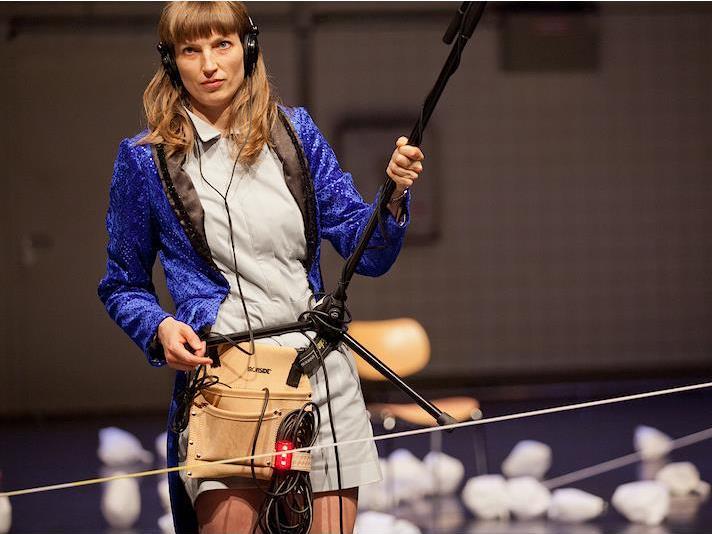From a close corner of North Melbourne Town Hall, Kate McIntosh takes her audience in as we find ourselves perched in rows across a seating bank, spread out before her large lab desk. She sits, examining, with notepad and pencil at the ready; waits for us to settle.
Between the desk and the far wall, where the stage proper is left unlit, is arranged a loose and inscrutable mise-en-scène: an unruly cluster of chairs is set toward the back, from which lines of white string run at narrow angles across the width of the space, hanging slack down the right-hand wall from their nodal lighting bracket.
The doors are shut and, as if on cue, the audience falls silent under McIntosh’s curious observation. After a long pause, she raises a microphone to her mouth, and, focusing her gaze, begins. ‘How many whistlers do we have in the audience? Raise your hand if you can whistle.’
The whistlers raise their hands, and she begins to count. Someone calls out ‘I can whistle sometimes, but other times I can’t.’ Taking the rest of her tally with a seemingly cursory scan, she makes a note: ‘35.5 whistlers.’
Without so much as standing, McIntosh follows a meandering and deliberately paced line of inquiry: who would consider themselves punctual people; whose first language is not English; who finds the sound of rain at night calming; raise your hand if you are concerned by surveillance. Characterised by the kind of broad equivocality commonly ascribed to the pop psychologist and fortuneteller, the content of these questions is countered by the sustained intensity of the pollster’s scrutinisation.
Measured according to raised hands, clicks, the stomping of feet, or the whirring of minds in segments of thinking-through, data is gathered toward unknown ends: but with its accumulation comes the endless unfolding of a clearer and clearer image of the audience as collective, in all its complexity.
Bringing together the profound and the banal, with metaphysical and philosophical tangents tethered to an insistence on the here-and-now, it is the tension between these elements that generates the absurd humour running through this protracted study.
‘It’s time to get concrete,’ McIntosh says, finally standing up from her desk. ‘Under your seat is a paper bag.’ She asks us to count up all of the people tangled up in our lives, and to breathe the number into our bags. They are passed forward and tossed onto the floor, containing our families, our friends, our lovers, our ghosts; McIntosh sweeps them together, close to the cluster of chairs and across the network of strings.
All parts in place, she proceeds to hand out paddles wound with string to members of the audience, attaching us to the so-far stationary contraption spanning the whole room. Before exiting the hall, she leaves us with the instructions to execute a noisy act of entropy: the drag and scrape of a spade against polished floors, the chairs collapsed and pulled up the wall, the scatter of marbles and the pop of paper bags reverberate through the space.
Amid the clatter and bang and the reckless joy of destruction arises an ephemeral sonder*. We sit, like birds in the wind, and witness the crashing together of our worlds, with the strung together contraption elaborating a brief moment and poignant metaphor across the whole of our lives: and so we produce our own chaos and catharsis.
Closing with an extended diagnostic report, McIntosh celebrates the simple fact of our being together, and the visions that have opened up between us, in all directions, and laments the impending break of our temporary agreement.
She returns to a thought she had in that first, long moment, as she watched us ‘sitting quietly, close together, being calm … silent, ready, waiting for something to happen.’
And so we find McIntosh’s mode of ethnography has been one working in reverse: it is only through her investigation that we have gained any curiosity for the people sitting beside us, and begun to cohere as a whole.
‘I remember thinking, maybe we should just stop there.’
With the experiment over, our communion is broken, and we leave the seating bank empty, again, a space charged and ready for reactivation as we flood the city streets, filled with a fascination for the crowd.
Rating: 5 out of 5 stars
All Ears
Presented by Arts House and SPIN
Concept, text and performance by Kate McIntosh
Arts House, North Melbourne
3 – 6 September
* sonder: n. the realisation that each random passerby is living a life as vivid and complex as your own—populated with their own ambitions, friends, routines, worries and inherited craziness—an epic story that continues invisibly around you like an anthill sprawling deep underground, with elaborate passageways to thousands of other lives that you’ll never know existed, in which you might appear only once, as an extra sipping coffee in the background, as a blur of traffic passing on the highway, as a lighted window at dusk. (The Dictionary of Obscure Sorrows)





